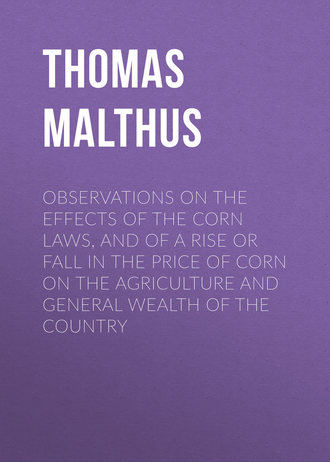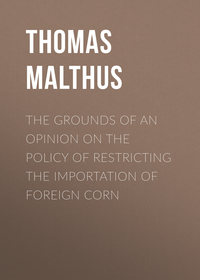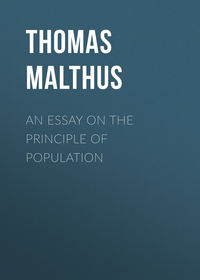 полная версия
полная версияObservations on the Effects of the Corn Laws, and of a Rise or Fall in the Price of Corn on the Agriculture and General Wealth of the Country
But the fact is that the whole difference of price does not by any means arise solely from taxation. A part of it, and I should think, no inconsiderable part, is occasioned by the necessity of yearly cultivating and improving more poor land, to provide for the demands of an increasing population; which land must of course require more labour and dressing, and expense of all kinds in its cultivation. The growing price of corn therefore, independently of all taxation, is probably higher than in the rest of Europe; and this circumstance not only increases the sacrifice that must be made for an independent supply, but enhances the difficulty of framing a legislative provision to secure it.
When the former very high duties upon the importation of foreign grain were imposed, accompanied by the grant of a bounty, the growing price of corn in this country was not higher than in the rest of Europe; and the stimulus given to agriculture by these laws aided by other favourable circumstances occasioned so redundant a growth, that the average price of corn was not affected by the prices of importation. Almost the only sacrifice made in this case was the small rise of price occasioned by the bounty on its first establishment, which, after it had increased operated as a stimulus to cultivation, terminated in a period of cheapness.
If we were to attempt to pursue the same system in a very different state of the country, by raising the importation prices and the bounty in proportion to the fall in the value of money, the effects of the measure might bear very little resemblance to those which took place before. Since 1740 Great Britain has added nearly four millions and a half to her population, and with the addition of Ireland probably eight millions, a greater proportion I believe than in any other country in Europe; and from the structure of our society and the great increase of the middle classes, the demands for the products of pasture have probably been augmented in a still greater proportion. Under these circumstances it is scarcely conceivable that any effects could make us again export corn to the same comparative extent as in the middle of the last century. An increase of the bounty in proportion to the fall in the value of money, would certainly not be sufficient; and probably nothing could accomplish it but such an excessive premium upon exportation, as would at once stop the progress of the population and foreign commerce of the country, in order to let the produce of corn get before it.
In the present state of things then we must necessarily give up the idea of creating a large average surplus. And yet very high duties upon importation, operating alone, are peculiarly liable to occasion great fluctuations of price. It has been already stated, that after they have succeeded in producing an independent supply by steady high prices, an abundant crop which cannot be relieved by exportation, must occasion a very sudden fall.4 Should this continue a second or third year, it would unquestionably discourage cultivation, and the country would again become partially dependent. The necessity of importing foreign corn would of course again raise the price of importation, and the same causes might make a similar fall and a subsequent rise recur; and thus prices would tend to vibrate between the high prices occasioned by the high duties on importation and the low prices occasioned by a glut which could not be relieved by exportation.
It is under these difficulties that the parliament is called upon to legislate. On account of the deliberation which the subject naturally requires, but more particularly on account of the present uncertain state of the currency, it would be desirable to delay any final regulation. Should it however be determined to proceed immediately to a revision of the present laws, in order to render them more efficacious, there would be some obvious advantages, both as a temporary and permanent measure, in giving to the restrictions the form of a constant duty upon foreign corn, not to act as a prohibition, but as a protecting, and at the same time, profitable tax. And with a view to prevent the great fall that might be occasioned by a glut, under the circumstances before adverted to, but not to create an average surplus, the old bounty might be continued, and allowed to operate in the same way as the duty at all times, except in extreme cases.
These regulations would be extremely simple and obvious in their operations, would give greater certainty to the foreign grower, afford a profitable tax to the government, and would be less affected even by the expected improvement of the currency, than high importation prices founded upon any past average.5
1
From the reign of Edward III to the reign of Henry VII, a day's earnings, in corn, rose from a pack to near half a bushel, and from Henry VII to the end of Elizabeth, it fell from near half a bushel to little more than half a peck.
2
Wealth of Nations, b. iv, c. 2, p. 202.
3
The cheapness of corn, during the first half of the last century, was rather oddly mistaken by Dr. Smith for a rise in the value of silver. That it was owing to peculiar abundance was obvious, from all other commodities rising instead of falling.
4
The sudden fall of the price of corn this year seems to be a case precisely to point. It should be recollected however that quantity always in some degree balances cheapness.
5
Since sending the above to the press I have heard of the new resolutions that are to be proposed. The machinery seems to be a little complicated, but if it will work easily and well, they are greatly preferable to those which were suggested last year.
To the free exportation asked, no rational objection can of course be made, though its efficiency in the present state of things may be doubted. With regard to the duties, if any be imposed, there must always be a queston of degree. The principal objection which I see to the present scale, is that with an average price of corn in the actual state of the currency, there will be a pretty strong competition of foreign grain; whereas with an average price on the restoration of the currency, foreign competition will be absolutely and entirely excluded.





